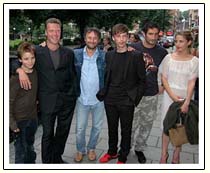|


|
DAG OCH NATT (2004)
|
ROLE: Jacob
GENRE: Drama
COUNTRY: Sweden/Denmark
SWEDISH PREMIERE: August 6, 2004
|
 |
|
|
|
|
Synopsis |
|
The film starts with a voice-over telling the audience
that on September 11, 2003, a man named Thomas committed
suicide by shooting himself in the head. The rest of the
film depicts the day leading up to this act, with Thomas
meeting for the last time various people who in some way
or another have meant something to him. By letting the
audience know from the start how the film will end, the
director deepens and darkens the tragedy without
resorting to any will-he or won't-he suspense. It’s the
tragic story of a man who hates himself and what he has
become, and who finally commits the ultimate act. |
|
|
|
Film Details |
|
Mikael Persbrandt - Thomas Ekman
Sam Kessel - Emil
Maria Bonnevie - Sarah
Michael Nyqvist - Jacob
Lena Endre - Anna
Hans Alfredson - Bilisten
Pernilla August - Eva
Fares Fares - Kristian
Marie Göranzon - Modern
Tuva Novotny - Desiré
* * * * *
Director - Simon Staho
Screenplay - Peter Asmussen, Per Nielsen & Simon Staho
Cinematography - Kim Hřgh
Music - Joachim Holbek
* * * * *
90 minutes
* * * * *
Watch clip of Michael's scene
|
|
Production Notes |
|
Filming began on November 10, 2003
for 15 days around the streets of Gothenburg, Sweden.
Two cars were connected by an 'umbilical cord'. In the
first car, which dragged the second, sat Simon Staho,
who followed the filming by a monitor. In the other were
three people - Mikael Persbrandt, his current passenger,
and the script girl in the trunk. For the director, it
was a dream to film everything in a car with no problems
with lighting and equipment. Only two small DV cameras
mounted on the dashboard. |
|
|
|
Publicity Stills |
|
|
|
|
|
Premiere photo |
|

|
|
|
|
Commentary |
|
The film is very Swedish with its
heavy mood, broken relationships, suicide and perpetual
perpetuity. It's ninety minutes of fear but relentlessly
played well. "Dag och Natt" is admirable concentrated
and reserved. Directer Simon Staho shows deep feelings
with minimalistic means. The whole film plays in
Thomas's car, which could have had poor results, but it
is balanced by sharp editing and brilliant acting.
Persbrandt is sometimes almost
without expression, but there is no doubt about his
inner hopelessness. Thomas is the portrait of a man who
has committed too many mistakes in his life. He is an
alcoholic, was unfaithful, has deceived and been
deceived and now sees no way out. It is an emotionally
strong and heavy movie with almost no humor but very
worth seeing.

 |
|
|
|
|
|